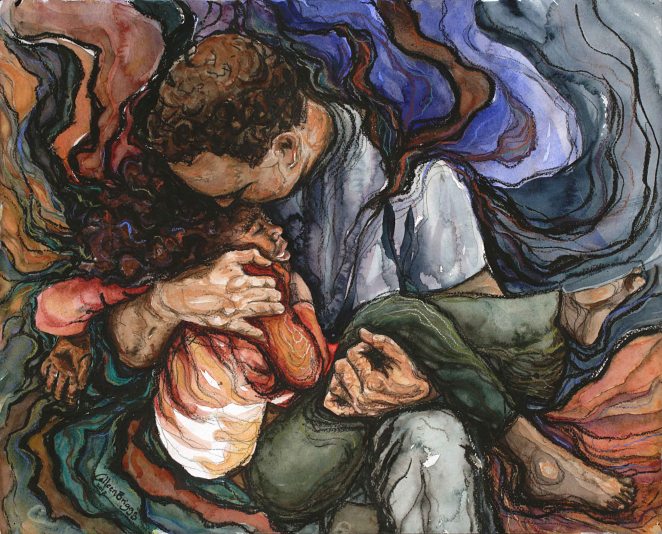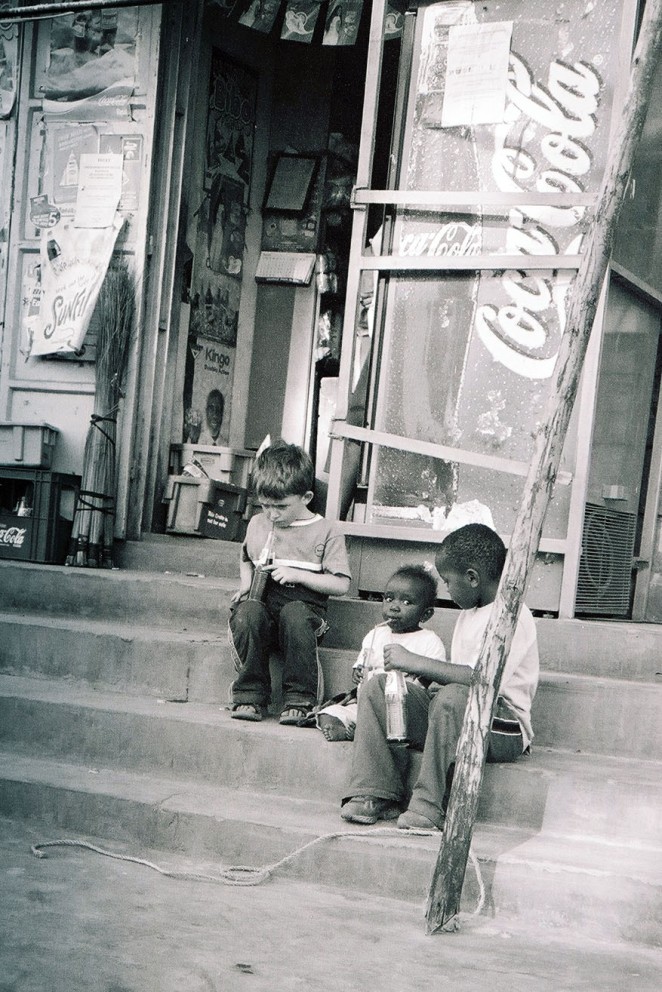
ORIGINAL: Carried; 2012; 16.25″ x 20.25″; mixed media: charcoal, watercolor, pastel. FINE ART PRINTS: Limited edition of 100; 14″ x 17.5″.
The news shattered me into the red soil. Numb with shock, my weak reply floated with wisps of dust as I sank to the ground, “Mwenda, that’s it. I’m done. I’m going home.” Only after I hung up the phone did tears overflow. There, in the open space of a dirt volleyball court on the edge of Nairobi, with my head between my knees, I wept inconsolably.
After five grueling months of battling enemies within and without to adopt our daughter from a Kenyan orphanage, our lawyer was calling to tell me that he and a Mother Teresa sister couldn’t find each other at court to appear before the judge; so the first of three court dates of our third legal process was postponed two more weeks. It seemed I was no closer to bringing our fourth child home than the day I set foot in Kenya five months prior.
Our first legal process ground to a shocking halt when I arrived in Kenya in late January, 2005, only to discover that our first lawyer had disappeared with all of our money and that of twenty other adoptive parents. Simultaneously, I heard foreboding whispers that courts were no longer granting guardianship to foreigners, the legal process we were relying on in order to reunite our family within 6-8 weeks. Several American families completed adoptions during the previous year through this legal provision; but unbeknownst to us, Kenya’s adoption laws were in rapid re-interpretation even as I stepped off the airplane. Lily, the 20-month-old child we planned to adopt, came into my care two days after our arrival in-country. There was no choice but to persevere in navigating a system in flux, one day at a time.
Certainly God provided manna in the desert. My children and I savored succulent high-season mangos and avocadoes, fresh from the tree. We enjoyed little outings to the nearby town to drink a soda. I practiced my elementary Swahili with friendly local shop owners. We lingered over evening chai with dear friends, the Karaus, who became like family to us. Pastor Karau and I visited a man dying of AIDS and prayed with him to receive Christ, and we were able to locate an orphanage for his young nephew who would soon be left without a caregiver. Impoverished friends invited us into their homes and spent a week’s wages to honor us with special feasts. Kenyan acquaintances sympathized with our case, and contacted long-lost relatives who might have inside influence. Immersed in Kenyan society, there were days at a time when my biological four-year-old son and I were the only White people for miles; I was privileged to gain the insight into my adopted children’s birth country that can only be earned by living there. A steady stream of American family members traveled sacrificially to Kenya to keep us company. Our third lawyer, Mwenda, cared for our hearts as well as going above and beyond the call of duty for our case. I delved deeper into daily dependence on God than ever before in my life.
But as the days turned into weeks, and the weeks stretched into months, my heart ached for my husband and oldest son, age 7, who remained in the US for work and school. Our two four-year-olds missed them terribly. When my husband and oldest son came for a court date two months into the process, a second legal proceeding to obtain guardianship that ultimately was denied, and returned home without us, I didn’t know when I would see them again. I couldn’t seem to quell irrational waves of anxiety that I would be left alone indefinitely. The cost of maintaining house-holds in two countries as well as multiple legal processses sucked our savings dry and left us tapping a home-equity loan. Due to details of Lily’s particular case in addition to Kenya’s fluctuating adoption laws, I wrestled with the suffocating nightmare that I would return home without this child we so longed to claim, this daughter I had known for almost a year and had cared for as my own on Kenyan soil for five months. To complicate matters further, my daughter displayed behavioral patterns typical of a child who has lost birthparents and previous caregivers and is afraid of attaching to another; she hit and tried to bite me and cried incessantly.
On the day of Mwenda’s call, we were basically homeless, staying in the compound of a Christian organization that took pity on us. They allowed us to rent space in their student hostel for a few months, and then a flat that we shared with the workers as their employee lounge. We were grateful simply to have somewhere to sleep, but I was weary from single-parenting our three children constantly in the public eye. I felt badly for intruding much longer than expected, and yet I had no idea where else to go. And even though I knew so many of my Kenyan friends struggled with far more severe challenges, I was tired of lying in bed listening to rats rummaging through the plastic bags where we stored our food overnight.
As I floundered in the wake of Mwenda’s crushing news, my soul stepped off a precipice, utterly free-falling at last.
Only to be gathered up and carried.
An hour or two after the call, a Kenyan friend arrived to help us re-locate. Another new friend negotiated for us to stay in the home of a missionary on furlough. Uncontrollable tears still streaked down my face as we loaded up the sparse, rag-tag pile of earthly possessions that comprised our sojourner “home.” Three confused little kids who simply wanted a stable mother and a present father, climbed into the van next to me. And just like that, we were whisked away to the Garden of Eden.
It really was. Rossalynn Academy is an international school located in a large, well-protected compound with lush flowers and trees; and best of all for an introvert emerging from five months in shared-living conditions, it was mostly empty for a school holiday. We were given an entire house to ourselves with a beautiful vine-covered patio. We could eat when we wanted, sleep in quiet, and I felt the pressure lift of feeling like everyone was watching to see if I knew how to take care of a Kenyan child. There was even a playground, a trampoline, and a sweet dog that came with the house.
The Karaus called me throughout the day we moved, but I didn’t answer. I was too depressed to talk to anyone, even these dear friends. That night, they tracked us down. Their sudden entrance into our new living room ushered in God’s palpable tenderness. After that, sunrise and sunset passed uneventfully, a balm of healing. I rested by “Elijah’s brook.”
On the day when evil threatened to overwhelm me, when my last shred of hope leeched away, I cried out to God; and He heard me. He spoke into the darkness, “Enough!” He saw the last spark of light in my soul and shielded its tiny flicker.
Yes, I know what it feels like to be carried. And the memory compels my heart to do what it can to help carry those He loves so much: the orphan, the widow, the vulnerable.
How has He carried you?
…………………………………………………………………
Limited edition fine art prints of “Carried” are now available through Pamba Toto fine art prints.

So beautiful! Your words and God’s provision. Thanks for sharing these memories and this testimony with us.
LikeLike
Great post sweetie. Did you write it for someone particular?
Dave
LikeLike
I wrote it for all of us – sometimes in the trenches of life, we need to be reminded to stop and remember God’s steadfast love in the past. He won’t forsake us now! I feel so privileged to wait upon Him with you…
LikeLike
And to think that you lived through it all. Praise God from whom all blessings flow! Love, Mum
LikeLike
Amen! 🙂 Couldn’t have made it without your support.
LikeLike
That is so beautifully told Colleen! Makes me realize I need to read your pasts posts. You have had such a full life. I don’t think I would have had the strength to go through what you did. Feeling very emotional. I love that painting even more now.
LikeLike
A remarkable story and painted creation -love the emotion captured in the girls expression.
LikeLike
Thank you for visiting, and most of all, for speaking up for the voiceless!
LikeLike